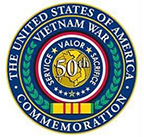 |
The Cherokee Scout is compiling submitted Vietnam War-era memories from Cherokee County residents for its annual Celebrating Our Veterans magazine coming out in November.
The year 2023 is the 50th anniversary of the end of U.S. involvement in the Vietnam War, and I believe this project can bring about healing and closure for that tumultuous period in American history.
It’s a hard ask, I know. Vietnam veterans have been conditioned to avoid talking about their wartime service but, believe it or not, it’s not unique to the Vietnam War.
My father was an 18-year-old Navy radio operator late in World War II and, despite my frequent requests as a child growing up in the 1960s and ’70s, he didn’t talk about it.
 |
He kept a desk in his garage. Properly mounted on the wall behind it was a Japanese infantry rifle and a 48-star U.S. flag. A parachute was used to line the ceiling. The rifle’s barrel was filled with cement, so it was a keepsake and not a firearm, but it drew my attention every time he let me back there.
It was his garage. All the kids on my block got full use of their garages, including tools and whatever else they found, but not my dad’s garage. It was his private domain, and he could tell whether someone had violated it. He kept everything – he was a meticulous, organized hoarder – and I am sure there was a treasure trove of war memorabilia in the boxes, crates and footlockers he had stacked against the walls and suspended from the ceiling.
By the time I reached my mid-teens, my father offered to give me the rifle – but something told me I would never be able to give it the respect and care it deserved or that he expected, so I respectfully declined.
My dad was in his 50s around that time, and we spoke no more about the rifle; I think he felt snubbed in his first attempt to reach out. Still, he rummaged around an old foot locker and pulled out Navy binoculars and offered that, instead; I accepted the gift and cherished it until it disappeared a few years later.
Some 20 years went by and my father, by then in his mid-70s, started talking about his wartime service. But I was in my mid-30s and lived far from my childhood home. I spoke with him a few times a year and visited during major holidays that were dominated by other things that often descended into family fights, so what my father managed to fit in about his war service was sparse.
He never explained his change of heart, but I think he saw the end nearing and opportunities running out for war stories that would be lost upon his passing.
He bought a word processor and typed out his recollections. As time went on, he spoke more about the war. By the time he was in his 80s, his war service was almost all he talked about.
They were the same four or five stories, and we shared a frustration: me about hearing the same stories again, and him by my apparent lack of interest and disrespect.
It wasn’t until he was in a nursing home a year before he died that I found a better way to communicate with him about his history. He didn’t like to be interrupted, and it took some courage on my part, but as he reached a point that sounded interesting, I asked him to elaborate.
My role switched from cowering son of a domineering Texan to a journalist steering the conversation. The result were dozens of new stories. A bond formed during my last few visits that we never enjoyed before.
His history went from a wire frame with three or four main points, to a story full of nuance, rich in detail and genuine emotion. I am sure it was far more satisfying for both of us.
I was unable to see my dad the last year of his life because of COVID-19. When he entered hospice, nurses prescribed morphine to help him cope with severe COPD, and he gradually fell into a coma. My sister arranged for a Zoom call, so I could watch as the nursing home chaplain presented a certificate for my father’s World War II service.
Something peculiar happened or, put a better way, miraculous and wonderful.
My dad woke up and, once he figured out what was happening, he again launched into a World War II story. It was one of his usual ones, one that I’d heard many times, but this time I didn’t mind or try to steer the conversation.
Just like my dad, he didn’t acknowledge my sister in the room or me on his iPad watching via FaceTime from a continent away. His attention was focused on the chaplain, a man who he just met, a new person to share his stories.
He went on for the better part of an hour telling about how he ran into his cousin somewhere out in the Pacific while his ship was being repaired from battle damage. His voice gradually faded until he looked off absently and fell back into a coma. They were his last words, one last story to tell. He died a couple of days later.
If you served during the Vietnam War era, please type out your memories and email them to me at editor@cherokeescout.com. Don’t let your voice be silenced or your personal history be lost.
Randy Foster is editor at the Cherokee Scout. He served in the U.S. Marine Corps from 1979-85, primarily at Camp Lejeune.
